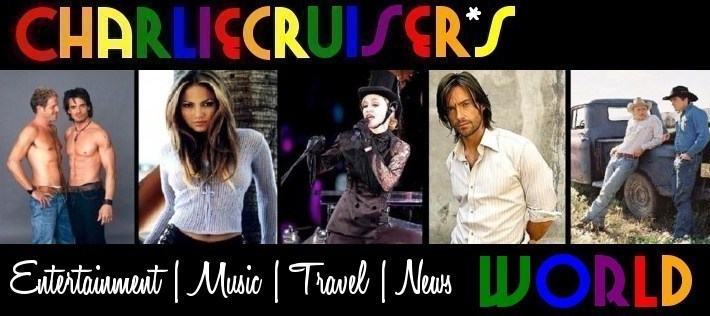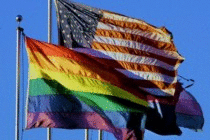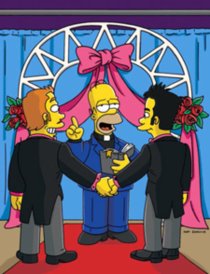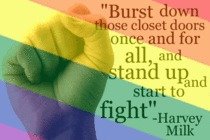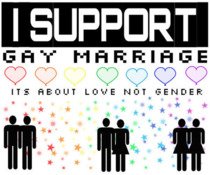 Charles Perez, the former television anchor and talk show host, has a new memoir that pulls no punches. Perez talks to Neil Broverman from The Advocate about Confessions of a Gay Anchorman, and why many TV journalists are stuck in the closet.
Charles Perez, the former television anchor and talk show host, has a new memoir that pulls no punches. Perez talks to Neil Broverman from The Advocate about Confessions of a Gay Anchorman, and why many TV journalists are stuck in the closet.Even though he was out back then, Charles Perez's time hosting his self-titled talk show in the '90s was relatively scandal free. After the show wrapped in 1996, Perez transitioned into the role of television journalist, working for the program American Journal, and then serving as a weekend anchor on the number one station in the country's largest market, New York's WABC.
In 2008, Perez was named main evening anchor at WPLG in Miami — a job he says was a joy until bad publicity, regarding an ugly break-up with an ex-boyfriend, began rearing its head. Perez says his bosses become anxious about the headlines surrounding his personal life, called him "too soft," and then pulled him from the main anchor desk. After filing a complaint under the Miami-Dade Human Rights Ordinance, Perez was fired; WPLG says it had nothing to do with Perez being gay and, since the scandal erupted in 2009, the complaint against WPLG has been dismissed.
Perez's tumultuous time at WPLG, along with his entire career in front of the camera, is documented in his new memoir, Confessions of a Gay Anchorman. Happily married and with a new baby daughter, Perez talked to The Advocate about his book and why it's so hard for some television journalists to come out.
The Advocate: Why did you want to write the book?
Charles Perez: I would not change anything about how my life has unfolded—I have an amazing husband and a beautiful daughter. But when I parted with my last station, WPLG in Miami, which, up until the end, was a great relationship—I felt like two things finally collided—Charles Perez, the TV anchor personality, and Charles Perez, the gay man. And when they did, I felt like fate put me on that intersection and I had to deal with it. It had been a long time coming.
How have people reacted to the book?
I think there’s two reactions—I stay away from reading things online; lots of people have lots of opinions and I have no power over what people think and they have a right to their opinion. But especially with the book, many people with opinions haven’t read it yet. Facebook is a great example—a lot of people have started reaching out to me, particularly young gay men. Most of all, I wrote the book because I thought we have to erase the shame associated with being gay. It’s time for gay men to have our own Rachel Maddow, if you will. There are lots of examples of gay men on television, thank God—there wasn’t when I was coming out in the '80s. But even though that changed, I do believe there’s still a ceiling. I think that’s really disconcerting and I wanted to put a spotlight on it. I know that makes some people uncomfortable, but nothing changes until it changes.
In the book, you mention a newspaper article that had the headline, “Charles Perez, Too Gay for WPLG?” How strongly did you feel there’s a limit on journalists’ "gayness?"
I give an example in the book of a co-worker who called one of our meteorologists “too gay”; he needed to be tempered. First of all, [the gay man] was a great meteorologist. Bottom line. And that’s the other message of the book—as Martin Luther King said, we should be judged on the content of our character. We should also be judged by the quality of our work and our results. But in today’s corporate culture, particularly if you’re on camera, you’re a commodity. Being gay is still considered by the top brass a liability. They’ll take that shot with you if you’re a reporter in the street or if you’re a morning anchor, but if you’re the main evening anchor that they’re putting their image behind—not so much. This is true at a local stations and at a national network. [Executives] might be OK with it, but there’s an unspoken expectation that you will not only not lead with it, but you will allow the misperception that you’re straight to be perpetuated.

Does Joe the Plumber, et al, care if he gets his news from a gay anchor?
I don’t think they care. And if they care, they care for a moment and then they’re more interested if you’re doing a professional job. I think the fear comes more out of advertisers and out of television executives who are afraid what advertisers will think. Ellen DeGeneres is a great example, if you go back to her sitcom. When she came out, there were great ratings, everything was fine, and then unfortunately advertisers started to pull out and ABC didn’t stand with her; they dumped the show. I think in the long run, Ellen and Rosie O’Donnell and Rachel Maddow have proven the case—if you’re good, no one cares. But I think there is a double-standard with men. The Celluloid Closet put a spotlight on how gay men were only allowed in films as jesters or clowns. There are a lot of great people who are on TV today and accepted by management and their colleagues, but there also sort of the role of “Jack” on Will and Grace. That’s unfortunate and needs to change. We can’t be that narrow; our community is broader than that.
Congratulations on your new baby, Madeline. What are your thoughts on Florida’s new house speaker Dean Cannon recently telling the Florida Baptist Witness that he’s interesting in enforcing the gay adoption ban that was struck down last year?
It’s not over until it’s over. And this is an example, like the TV business. Bigotry and discrimination continue to exist, and the fact that some politicians would be willing to consider reversing this decision and reinstituting a ban on gay adoption—Florida being the only state in the union that had a specific ban on gay adoptive parents—tells you there are still a lot of people uneducated about what it is to be gay. I don’t really believe George or Laura Bush had a problem with gay people; they had staff members who were gay. But Bush was willing to stand up and propose an amendment to the Constitution to limit our freedom for political reasons. That may be what’s happening in Florida, but that hurts people like our daughter.
We’re not perfect parents but I dare you to come into our home and tell us we don’t love and care for our child as well as anybody can or would. Unfortunately, there are a lot of people in Florida who get behind this issue. When I left the station, most of the response that I had from viewers was really supportive. But there was one guy who wrote me a letter and said, “I am going to do everything I can to get my congregation to start a campaign against you to make sure you never work in this market again.” And I thought, That’s a good use of your time.
As I wrote the book, the “It Gets Better” campaign started. I love the campaign, but it also falls short. The message is that it gets better after you leave your home, after you leave your school, after you leave your place of worship. Shouldn’t we try to make it better in those places? Along with the book, I’m launching the “No Shame” campaign, and people like [openly gay former baseball player] Billy Bean are involved. The purpose of the campaign is to make it OK to be gay and unacceptable to shame someone for being gay—at home or church. It’s no longer OK for someone like Joel Osteen to say homosexuality is a sin.
There was a cover of Time magazine in 1976 with two men holding hands. My dad held it up and said, “Enough with all these damn queers. They should put them on a damn island and get rid of them.” At 13, I shrank and told myself no one would ever know I was gay. Every time a preacher or politician takes an antigay stance, they do that.
How important is passage of the Employment Nondiscrimination Act?
When I lost my job in Florida, I was struck by the lack of employment protections for gay people in this state. I knew I’d be OK; I had a high-enough profile. But I thought about the kid who works in the hardware store or the young mother who’s gay and her employer find out and cans her, regardless of how good she is—my heart went out to them because they have no recourse. When the House became Republican as a result of the midterm elections, a lot of people, including Barney Frank, felt the wind just leave their sails. But [ENDA] is not dead. It’s got to come back, and the earlier versions of it that didn’t include transgender protections were not right. We can’t do to each other what others have done to us. I would love to help champion [ENDA]. My agent said, “Do you want to carry around a gay flag?” I said, “No, but I want inequality to go away.” The only way for the issue to go away is to grant equal protection.
